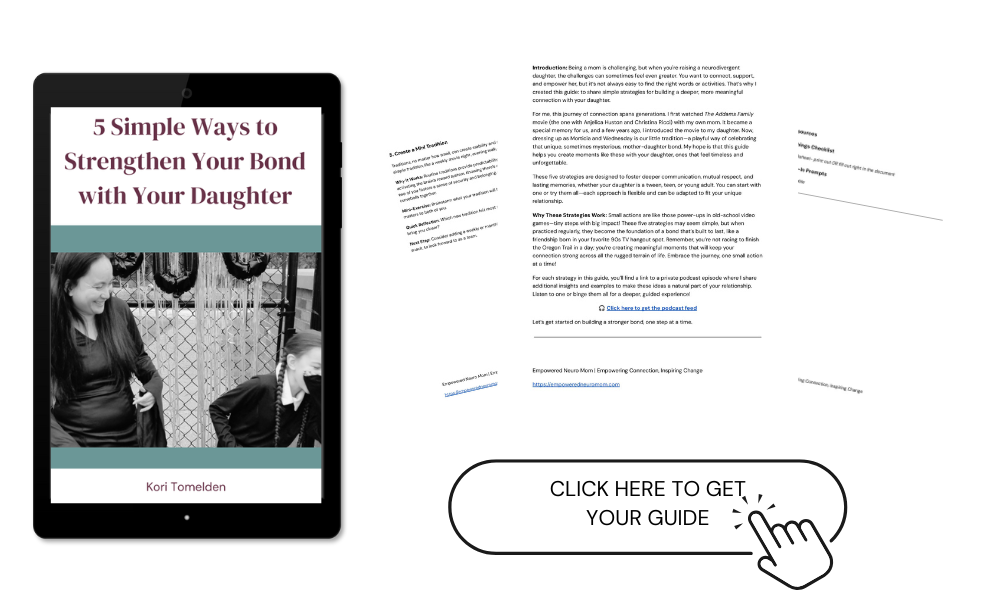As a neurodivergent mom, the pull to people-please can feel like second nature. Whether it’s smoothing over family conflicts, overcommitting to social obligations, or trying to meet every need of those around us, it often feels easier to say “yes” than to set a boundary. But over time, this constant giving—this sacrifice of self—starts to take a toll on our mental health, relationships, and even how we see ourselves.
I know this because I’ve lived it.
For years, I found myself nodding along to requests I didn’t have the bandwidth for and apologizing for things I didn’t need to apologize for. It wasn’t until one holiday season when I’d baked, wrapped, decorated, hosted, and exhausted myself to the brink of tears that I realized: saying “yes” to everyone else had left me saying “no” to myself.
It hit me like a brick. The perfection I was striving for? No one else noticed it but me. The peace I thought I was creating by smoothing things over? It wasn’t real peace. And the cost? My self-worth, my joy, and my authenticity.
How People-Pleasing Strains Relationships
What I’ve learned since is that people-pleasing doesn’t just hurt us—it hurts the relationships we’re trying so hard to protect. When we prioritize others' needs over our own, we can unintentionally build resentment, diminish our confidence, and create a dynamic where our authentic selves aren’t fully seen or valued.
Think about it: how can someone truly connect with the real you when you’re constantly hiding her behind a smile or a “sure, I can do that”?
The truth is, authentic living starts with reclaiming your self-worth. And when you begin to honor your own needs and boundaries, you create space for healthier, more meaningful relationships—ones built on mutual respect and understanding.
Reclaiming Your Self-Worth
- Acknowledge Your Worth Isn’t Tied to What You Do for Others
For so long, I equated my value with how much I could do for other people. I said yes because I thought being helpful, agreeable, or “easygoing” would make me more likable or loved. This led me to stretch myself too thin.
For example, I found myself not just volunteering for one role but taking on big commitments—like becoming PTA Vice President while also serving as Vice President of my church council. On top of that, I made meals for the Farmer’s Market for almost three years straight. Even though it was just a few weeks out of the year, it became too much. I wanted to help, to show I was reliable and capable, but I was exhausted. It took me a long time to realize I was trying to earn validation from others instead of giving it to myself.
Your worth isn’t tied to how many committees you join or how much you give. It’s inherent—you don’t have to prove it by overextending yourself.
- Practice Small Acts of Authenticity
Authenticity doesn’t mean turning your life upside down overnight. Start small. The next time someone asks for your time or energy—whether it’s another PTA request or a neighborhood event—pause. Check in with yourself. Ask, “Do I really have the capacity for this?” If the answer is no, practice saying, “I can’t right now, but I hope it goes well.” - Redefine What Success Looks Like in Relationships
Healthy relationships aren’t built on how much you can do for someone—they’re built on honesty, respect, and shared connection. Instead of measuring your success by how much you’ve given, try asking yourself, “Did I show up as my authentic self today?”
Building Confidence Through Boundaries
Setting boundaries is hard, especially if you’ve spent a lifetime pleasing others. But boundaries are a gift—to yourself and to those you love. They’re how we teach people what we need, and they’re how we create relationships that honor both sides.
Here’s one boundary I’ve learned to set: I don’t apologize for needing rest. As a neurodivergent mom, my energy is a finite resource, and when it’s gone, it’s gone. So now, when I feel my social battery draining, I politely excuse myself. No guilt, no explanations beyond, “I need a little recharge.”
And do you know what I’ve discovered? People respect me more for being honest about my needs. And the ones who don’t? Well, those aren’t my people.
A Loving Reminder for the Journey
Reclaiming your self-worth isn’t about cutting people off or saying “no” to everything. It’s about saying “yes” to yourself in ways that feel authentic and empowering. It’s about modeling self-respect for your daughter so she grows up knowing that she doesn’t have to twist herself into knots to be loved.
And when you take that step—when you let go of people-pleasing and embrace the real you—you’re creating a foundation for relationships that are deeper, stronger, and more fulfilling.
You’re enough, just as you are. And the right people? They’ll love you for it.
If you’re ready to take the first step toward more authentic connections, download my free guide, “5 Simple Ways to Strengthen Your Bond with Your Daughter.” This guide is full of practical, connection-based strategies to help you nurture your most important relationship—with your daughter—while staying true to yourself.
Because you deserve to feel seen, heard, and understood, too.



Comments